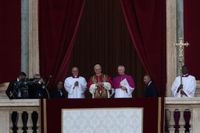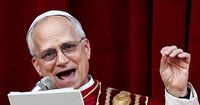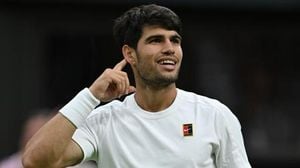In a historic moment for the Catholic Church, Robert Francis Prevost, 69, has been elected as the first Pope from the United States, taking the name Leo XIV. The announcement was made on Thursday evening, May 8, 2025, following the appearance of white smoke above the Sistine Chapel, signaling his election after a conclave that lasted over 24 hours and included four rounds of voting.
The new Pope succeeds Pope Francis, who passed away on April 21, 2025. Cardinal Dominique Mamberti, tasked with announcing the new Pope, addressed the crowd gathered in St. Peter's Square, proclaiming, "Habemus Papam!" around 7:15 PM. The moment was met with cheers and applause from the thousands present, eager to witness the historic event.
Born in Chicago on September 14, 1955, Prevost has spent significant time in Latin America, particularly Peru, where he served as a missionary and bishop. His deep ties to the region have drawn attention, especially from political leaders like Colombian President Gustavo Petro, who expressed hope that Leo XIV would advocate for migrants, particularly those from Latin America facing challenges in the U.S.
Prevost was appointed as the Prefect of the Dicastery for Bishops by Pope Francis in January 2023, a role that put him in charge of selecting bishops worldwide. His rapid rise within the Vatican and reputation as a moderate capable of bridging differing viewpoints made him a strong candidate to succeed the late Pope.
In his first public address, Leo XIV spoke directly to the world, emphasizing peace and unity. "Que la paix soit avec vous tous!" he said, his American accent evident in his Italian. He called for dialogue and cooperation among all peoples, stating, "We are all in God's hands. Without fear, united, hand in hand with God and among ourselves, let us move forward." His message resonated with the crowd, reflecting the continuity of Pope Francis's emphasis on compassion and outreach.
As the new Pope stepped onto the balcony of St. Peter's Basilica, he paid tribute to his predecessor, thanking Pope Francis and the cardinals for their support. His first blessing, "Urbi et Orbi," was a call for peace in the world, echoing the sentiments expressed throughout the conclave.
The conclave, which began on May 7, 2025, saw 133 cardinal electors locked in the Sistine Chapel, where they engaged in discussions and prayers, ultimately leading to the selection of Prevost. The process was marked by moments of tension, as black smoke had previously emerged from the chapel earlier in the day, indicating that no decision had been reached in the morning's votes.
Prevost's election marks a significant shift in the Vatican, as he is the first American Pope in history. His election was celebrated not only in Rome but also across the globe, with reactions pouring in from various leaders, including former President Donald Trump, who congratulated Leo XIV on his appointment. "What excitement and a great honor for our country!" Trump wrote on Truth Social, expressing eagerness to meet the new leader of the Catholic Church.
The atmosphere in St. Peter's Square was electric, with bells ringing from the basilica as the crowd erupted in joy upon hearing the news. The media coverage was extensive, with thousands of journalists present to document the historic occasion, transforming the area into an open-air press conference.
Prevost's background as a moderate within the Church and his experience in pastoral care are expected to influence his papacy. His ability to navigate complex issues, both within the Church and in the broader world, positions him as a leader who may seek to foster dialogue and reconciliation.
In the wake of his election, many are curious about how Leo XIV will approach the challenges facing the Catholic Church today, from issues of migration and social justice to the Church's role in a rapidly changing world. His past experiences and connections to diverse communities may play a crucial role in shaping his papacy.
As the world reflects on this historic election, the focus will undoubtedly be on how Leo XIV will lead the Catholic Church into the future, continuing the legacy of his predecessor while also addressing contemporary issues that challenge the faith.
With his unique background and perspective, Leo XIV's papacy could herald a new era for the Catholic Church, one that emphasizes inclusivity, dialogue, and a commitment to social justice. As the faithful around the world await his guidance, the hope for peace and unity remains at the forefront of his mission.





